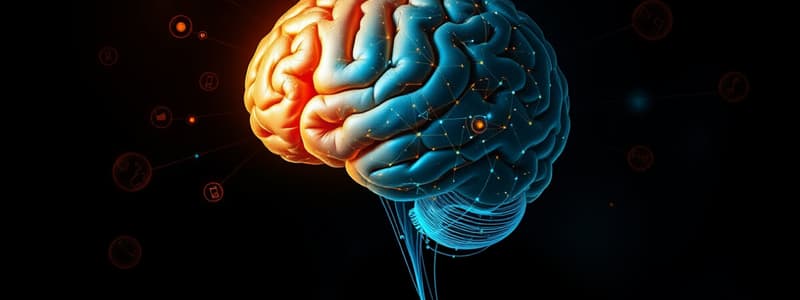Podcast
Questions and Answers
Which of the following represents the three self-schemas of self-awareness?
Which of the following represents the three self-schemas of self-awareness?
- Actual self
- Ought self
- Ideal self
- All of the above (correct)
What is social comparison theory?
What is social comparison theory?
We learn about ourselves and our behaviors by comparing aspects of ourselves with others.
Downward social comparison helps create a positive self-concept by comparing ourselves with those who are better than us.
Downward social comparison helps create a positive self-concept by comparing ourselves with those who are better than us.
False (B)
What do we call the trait characterized by overly high self-esteem and self-centeredness?
What do we call the trait characterized by overly high self-esteem and self-centeredness?
Who pioneered the cognitive-construction theory?
Who pioneered the cognitive-construction theory?
Which of the following is NOT one of Erikson's identity statuses?
Which of the following is NOT one of Erikson's identity statuses?
What is an identity moratorium?
What is an identity moratorium?
Freud suggested that awareness of one's own genitals leads to the development of gender roles.
Freud suggested that awareness of one's own genitals leads to the development of gender roles.
Which theory suggests personality is formed based on interaction with other people?
Which theory suggests personality is formed based on interaction with other people?
What are the two parts of the self according to the consciousness of self?
What are the two parts of the self according to the consciousness of self?
Flashcards are hidden until you start studying
Study Notes
The Self as Cognitive Construct
- Self-awareness encompasses three self-schemas: Actual self (current state), Ideal self (desired state), and Ought self (perceived obligations).
- Social Comparison Theory posits that individuals assess their behaviors and social status by comparing themselves to others.
- Downward social comparison enhances self-concept by comparing to others perceived as inferior; upward social comparison can lead to feelings of inadequacy by comparing to those perceived as superior.
- Self-evaluation maintenance theory suggests feeling threatened when someone close outperforms us.
- Narcissism is characterized by inflated self-esteem, self-admiration, and self-centered attitudes.
Psychological Perspective
- The self in cognitive psychology is understood as contextual, integrating cognitive capacities and experiences.
- Cognitive-Construction (Constructivism) originated with Jean Piaget, emphasizing that knowledge is constructed through experiences and reflections.
- In psychology, the self is viewed as a continuous, unitary experience, distinct from others.
Proponents of Psychological Inquiry
- William James: Differentiated between subjective 'I' and objective 'me'.
- Sigmund Freud: Developed the concepts of Ego, Id, and Superego in psycho-sexual development.
- Carl Jung: Introduced the concepts of the self and the shadow.
- Melanie Klein: Proposed the idea of the fragmented self.
- Erik Erikson: Focused on self and identity throughout the life cycle, critiquing psycho-social development.
Self, Identity, and the Adolescent
-
Erikson's theory of "Identity Crisis" was expanded by Marcia, identifying four identity statuses:
- Identity Diffusion: No identity crisis; lack of commitment to an identity.
- Identity Foreclosure: Accepted imposed identities without undergoing a crisis.
- Identity Moratorium: Experiencing a crisis with active exploration of identities, often resulting in confusion and rebellion.
- Identity Achievement: Resolution of crisis through evaluation and commitment to a chosen identity.
-
Resolution of identity issues involves a transition from dependence to increased independence, often manifesting through rebellion and resistive behavior.
Factors Influencing Adolescent Identity Formation
- Effective parent-teen dynamics include negotiation, support, reassurance, personal viewpoint development, and fostering individuation.
Development of Gender Identity
- Distinct roles and identities should not be conflated; they are interrelated yet different concepts.
- Caution against treating sex, sexuality, and gender as synonymous; transgender identity is distinct from transsexuality.
Freudian Perspective
- Awareness of genitals leads to erotic fantasies, resulting in gender role identification with adult figures.
Social Learning Theories
- Main assumption: Adult awareness of a child's genitals prompts differential reinforcement, resulting in gender-appropriate behavior modeling.
- Drive Theory (Clark Hull): Personality is shaped by social interactions.
- Operant-Learning Theory (B.F. Skinner): Behavior is driven by external factors.
- Cognitive-Social Learning Theory (Albert Bandura): Behavioral patterns emerge from reinforcement and observational learning.
- Situation-Interaction Theory (Walter Mischel): Behavior is determined by the interaction between the individual and the environment.
Cognitive Development
- Gender identity acquisition involves labeling by others and internalizing gender roles based on this input.
Jean Piaget's Four Stages of Cognitive Development
- Emphasizes that cognitive development is crucial in forming the conscious self divided into two aspects:
- "I": Represents pure ego and knowledge of self.
- "Me": Represents the self as understood through external perspectives.
Studying That Suits You
Use AI to generate personalized quizzes and flashcards to suit your learning preferences.



